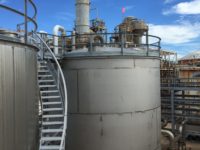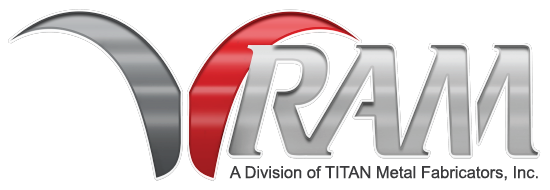Being a reactive metal, titanium has a stable oxide film that is corrosion and erosion resistant. The films growth is increase in strong oxidizing conditions. This oxide is continuously regenerating in the presence of water.
Industrial Titanium Applications

Titanium Grade 2 Brine Water Storage Tank, Titanium Gr. 2
Titanium has found a niche in many industrial applications where corrosion resistance is required. Here are some of the common applications of Titanium in corrosion-resistant service:
- Chlorine Chemicals
- Hydrochloric Acid
- Phosphoric Acid
- Sea Water
- Sulfuric Acid
- Nitric Acid
Chlorine Chemicals
Titanium is commonly used in applications that use chlorine. Examples of Titanium fabrication most commonly used in chloro-alkali cells as anodes, cathodes, bleaching equipment for pulp and paper, Heat Exchangers, Piping, Pressure Vessels, and Pumps for the manufacture of other intermediate organic chemicals.
Fresh and Sea Water
Titanium is corrosion resistant to fresh and sea water to temperatures of 500°F (260°C). Titanium has been used in sea water applications for decades without any form of corrosive attack.
Nitric Acid
Titanium is resistant to nitric acid in a wide range of temperatures and concentrations. Titanium fabrication is extensively used for process equipment in the handling and production of nitric acid. Titanium offers excellent resistance over a full concentration range at temperatures below boiling.
Hydrochloric Acid
Titanium has useful corrosion resistance in dilute hydrochloric acid applications. Small amounts of multivalent metal ions in solution can effectively inhibit corrosion.
Sulfuric Acid
Titanium is corrosion resistant to sulfuric acid only at low temperatures and concentrations such as 20% acid at 32°F and 5% acid at room temperature. Like hydrochloric acid, small amounts of multivalent metal ions in solution can effectively inhibit corrosion.
WARNING – Titanium with Red Fuming Nitric Acid
Titanium should not be use in applications in Red Fuming Nitric Acid. The use of titanium in red fuming nitric acid can cause a pyrophoric reaction that can cause damage to equipment and people.
Titanium Fabrications
RAM regularly fabricates the following types of Titanium custom process equipment:
- Pre-Engineered OEM Designed Custom Parts / Systems made with Titanium
- Titanium Columns Sections
- Titanium Reactors
- Titanium Pressure Vessels
- Titanium Piping Systems
- Titanium Pipe
- Titanium Spargers
Titanium can be used in applications listed below with full resistance*.
|
|
|
*Please Note: Final selection of material must be based on actual evaluation of the metal in the corrosive medium under study and is the responsibility of the end user. Temperature and concentration play an important factor in corrosion resistance.
Want to know more?
Please contact us by phone at (979) 885-2244. Email any questions to sales@reactivemetal.com.
